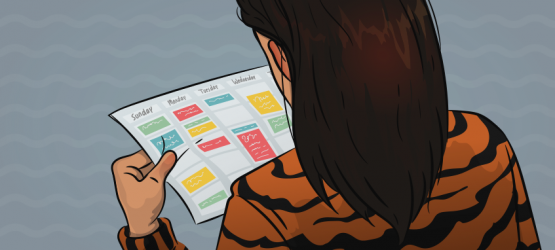How to Prevent Burnout While in College

Academic burnout is not a joke or a myth. It is a real thing that many students experience at some point in their academic career with all the stress and pressure faced every day. Nowadays, it is very common and may not be recognized from the very beginning. That’s why it’s so important to know what causes such stress and frustration and what you can do to avoid it.
What is College Burnout and Why Does it Happen?
Before we look at ways to avoid burnout, we should first discuss what it is and why it occurs. Here are some of the most common signs of burnout:
- Exhaustion. If you feel tired all day long, no matter how much you sleep, it means that your body is in a state of stress and is trying hard to fight stress hormones.
- Lack of motivation or inspiration. You can’t find a reason why you should continue studying.
- Lack of Focus. It’s hard for you to concentrate.
- Physical Pain. Headaches, migraines, dizziness, muscle aches.
- Negative Mood Changes. Increased irritability, sadness, or anger.
- Changes in Habits. Lack of self-care that is often exhibited in less rest and exercise, as well as excessive smoking, drinking and overeating.
- Social Awkwardness. Exhibiting increased anxiety, or an inability or unwillingness to connect with other people socially.
Now that you understand what college burnout looks like, here are three of the most common reasons college students find themselves suffering from it:
Academic and Social Pressure
Most students attending college worked hard to get there and excelled in high school. However, it is not uncommon for new college students to arrive at the university and find their course load tremendously more challenging than what they experienced in high school. The subsequent pressure to excel and succeed in this new environment can induce high levels of stress in many students.
Additionally, the sense that you could possibly fail a class and disappoint yourself and those close to you can instill a total sense of dread in college students that makes college even more difficult than it already is. Over an extended period of time, this stress can lead to fatigue or even exhaustion, and limit a student’s capacity to focus on his or her academic work.
Overextending Yourself
While you’re at school, the academic work alone can be difficult and time-consuming. However, most students do much more than just attending class and study when they’re at college. Many students have some sort of part-time job and may be involved in college sports and a myriad of social activities on campus. Most students remain involved with their families while they’re at school as well. Students can often find themselves overextended while they’re at school, with barely enough time to study or get sufficient rest. Overextended students often sacrifice critical self-care activities like resting, healthy eating, and exercising in order to keep their schedules intact. Over time, this lack of self-care could lead to burnout.
Social Isolation
While you may be in the presence of many people all day long while you’re in college, that doesn’t mean that you won’t get lonely. There are many times in school when you’ll have to forgo socializing with friends or roommates in order to study, conduct research, or write a paper. This experience can be socially isolating for many students. Moreover, most students are already away from their family and close friends at home, which can further exacerbate this sense of isolation. We are social animals, and over time this sense of isolation can bring about depression and fatigue in many students, which makes it really difficult to focus on academics. Check out our blog post on how to deal with having no friends in college to learn more about coping with social anxiety.
Some of the signs above might go beyond burnout and point to depression or some other serious health issues, so if you feel that you cannot cope with your problems on your own, seek out the help of a counselor or other health professionals.
Now, here are some great tips on how to prevent burnout as soon as you start recognizing the signs above in yourself.
Keep Your Long-Term Goals in Mind
One of the best ways to avoid college burnout while is to remember the big picture. You are at school for a reason; more likely than not, you are pursuing the career or vocation of your dreams, and obtaining a degree is a critical part of reaching that goal. So, no matter how stressful or tiring things get at school, keep in mind that college is just one step toward achieving your dreams; this type of mindset can often help you fight through anxiety and fatigue and keep pressing forward.
Practice Self-Care
Don’t let the rigors and stress of academic life and tight deadlines wear you down. Ensure that no matter how busy you are in college, always practice self-care. Try to get several hours of sleep each night, exercise regularly, and eat healthy meals. Ensure you schedule some time each week to be alone, so you can decompress and relax.
 EssayTigers. All rights reserved. Copyright © 2020
EssayTigers. All rights reserved. Copyright © 2020
Don’t forget to do basic maintenance tasks either, such as keeping up with your laundry, tidying up your dorm room, and keeping up with doctor and dental visits. Focusing on self-care can keep you healthy and relaxed and enable you to avoid the onset of burnout.
Don’t Focus on Time
The most important thing about college burnout is that it makes you concentrate on the negative side of studying in college, especially at the time that you spend on it. So-called “time is money” way of thinking is very common among the students who experience burnout and makes them drop out of college in order to “stop wasting their time and start making money.”
However, the majority of students who left their colleges, regret their decision as going back is much harder after a long break than they once thought. Staying in college seems like a wise decision considering how much effort you have already put into studying.
So, try not to focus on the time that goes by. Let it just go as it goes and focus not on what you could do instead of studying, but on what you can do while studying.
Maintain Good School-Life Balance
College is often a challenging combination of studying, working, and socializing. Finding a way to balance all three of these things can be difficult for college students, especially if you’re on your own away from home for the very first time. While you’re in college, you will need to keep your academic work, social life, and other responsibilities in a careful balance.
Analyze your workload and learn how to create a schedule that works for you. Don’t try to fit into someone else’s model – your roommates might be able to work two jobs, attend all the classes, and be ready to party at any time, but you don’t have to be just like them. Live your life in a way that keeps you healthy and happy ad in balance, and you’ll be able to avoid college burnout.










